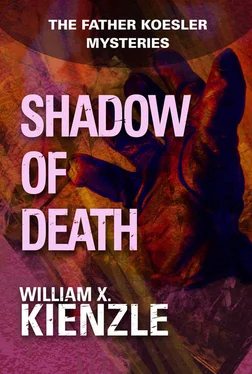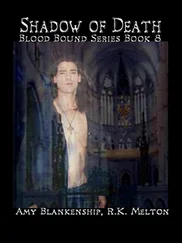Koesler and the Koznickis were seated about midway from the front of the church. Organ music was playing softly. Koesler was gazing absently at Joan Blackford Hayes. As he had already observed, she did resemble Elizabeth Taylor so it was pleasant gazing at her.
“How are you coping with our water shortage, Father?” Koznicki asked.
Koesler emerged from his daydream. “Not very well! When I saw that sign in the lobby this noon that due to construction work outside, the water would be turned off for a few hours, it never entered my head that by the time we left this evening, it still wouldn’t have been turned back on.
“You have no idea of all the things you depend on water for until you lose it. Not only washing, showering, and drinking, and brushing your teeth—but flushing. I can’t believe we’re paying to stay there—they should be paying us! And as for our concierge, who up till now has been very helpful, once the water was turned off he caught our bus driver’s disease and forgot how to speak English.”
Koznicki, smiling, shook his head.
Funny, thought Koesler, how easy it is to get used to talking in church. In the good old days, talking in church had ranked as a very common venial or lesser sin. He could recall when, as a young boy, each of his confessions had included many disobediences and not a few talkings in church. Must be some sort of hangover from times past, he thought. It’s still rare to see people talking in church. Generally, even when nothing is going on in a Catholic church, people—even whole families—just sit there, saying nothing.
But not in Rome. St. Peter’s resembled more a noisy museum than a church. And even here, in the more typical setting of a parish church, nearly everyone was talking to someone—albeit softly. He wondered whether silence in church would be a thing of the past for these pilgrims once they returned home.
He looked at his watch. 6:20. Funny, too, how you could get used to things starting late. It had taken less than a week in Rome to be infected by that domani attitude. It must, he thought, be a variant of Murphy’s Law. Something indigenous to Latinism, perhaps. If it’s important, it will find you. If it’s important, it will still be important tomorrow. If you don’t do it, relax; neither will anyone else.
Koesler’s stream of consciousness ran low and then out.
Suddenly, he was thrust back into reality. The soft dreamy organ music faded, to be replaced by strong, full-powered chords. Everyone was brought to his or her feet. It was the processional.
“Ecce sacerdos magnus, qui in diebus suis placuit Deo,” the choir sang. “Behold the great high priest, who, in his days, pleased the Lord.” The traditional choral greeting for a bishop.
All turned to the rear of the church to view the entrance of the procession. Instead of candle-bearing and cross-carrying acolytes, an elderly priest was jumping up and down, waving his arms frantically. Obviously a false start. But the choir sang on as the congregation had a good laugh.
“You were saying. Inspector, that Rome is a walking, talking cinéma verité?” said Koesler.
They chuckled.
Shortly, the choir director, who was himself searching for the missing procession, caught sight of the leaping monsignor. The singing stopped and the organ returned to soft, soporific music.
Gradually, lulled once more by the soft meandering organ music, Koesler’s mind slipped into neutral. He had drifted even beyond the innocent contemplation of Joan Blackford Hayes into shimmering recollective montages of quiet, peaceful visits to various small churches of the past.
His head began to nod. He had almost dozed off when he was abruptly jarred wide awake. Someone had slipped into the pew and knelt next to him. It was Ramon Toussaint, in lightweight black suit and roman collar. An ordained deacon, Toussaint was as entitled to wear such clerical garb as was a priest.
At one time, not that many years before, Catholic clerics were seldom out of uniform. Many were uniformed at all times except bed, bath, beach, or golf course. With a few sensible exceptions, Koesler was of that school. Most current younger priests were seldom in uniform. Some, reportedly didn’t even own a black suit, let alone a roman collar.
There was no doubt that Toussaint was a striking figure of a man. And that was especially true when in clerical garb. The black suit seemed to streamline his tightly muscled body. The immaculate roman collar was a narrow, neat band made whiter by being sandwiched between the black suit and his dark chocolate complexion. Close-cropped salt-and-pepper hair crowned his chiseled features.
Having made his prayer, Toussaint sat back in the pew next to Koesler. The priest introduced him to Wanda Koznicki. With Koesler and the Inspector between them, there was no point in attempting anything as physical as a handshake, so Wanda and Toussaint merely smiled and nodded at each other.
After a few moments, Koznicki leaned across Koesler and asked, “Were you able to get it? The list?”
Toussaint shook his head slowly. “No. It is a matter of timing. My sources assure me they will have it before we leave Rome tomorrow. Apparently, the Rastafarians involved in this plot have only one item that is their equivalent of our ‘Top Secret,’ and that is this list of papabili.”
Koznicki sat back with a worried look. A criminal investigation, he had often thought, was somewhat comparable to a football game played in inclement weather. Coaches seemed to agree that competing on a wet or slippery field favored the offensive team over the defensive unit. Particularly on pass plays, the receivers knew which receiving routes they would run. The defenders, on the other hand, were forced to react to the receivers’ moves. The unsure footing enhanced the odds the receiver would be able to outmaneuver the defender.
In the realm of crime, particularly in a premeditated attempt at homicide, the assailant knew well in advance of the event who the target would be. The law enforcement officer usually could only react to the assailant’s action. In such a situation, ordinarily there could be comparatively little crime prevention. Only a great deal of post-factum crime investigation.
It was one thing to suspect that Cardinal Boyle was the target of a murder plot, quite another to be certain of it. The measure of security that it would be possible to impose on a strong-willed Cardinal and possible to elicit from a limited number of carabinieri would be far different depending on the degree of certainty one could establish.
Koznicki wished he knew.
Koesler was about to divert Toussaint with an account of the previous false alarm that had triggered the nonprocession of dignitaries when, once again, the soft music tapered off and all the stops were opened.
“Ecce sacerdos magnus,” the choir poured out in rich polyphony, “qui in diebus suis placuit Deo. Ideo, jurejurando fecit illum Dominus crescere in plebem suam.”
Once again, the congregation stood and swiveled toward the rear of the church. There were indications this was no dry run.
Proof positive was the presence of television. Two camera crews were grinding away on the steps outside the church’s front door.
This phenomenon quite naturally caused its concomitant phenomenon: the gathering of a crowd.
Drawn solely by the magnetic power of television, people began first to cluster on the street outside the church. If TV cameras were present, this must be an Event. Thus, as the cameras retreated into the church, covering the entering procession, so then did the crowds enter.
TV had a little crowd/Its mind was blank as snow/And everywhere that TV went/The crowd was sure to go.
Читать дальше












